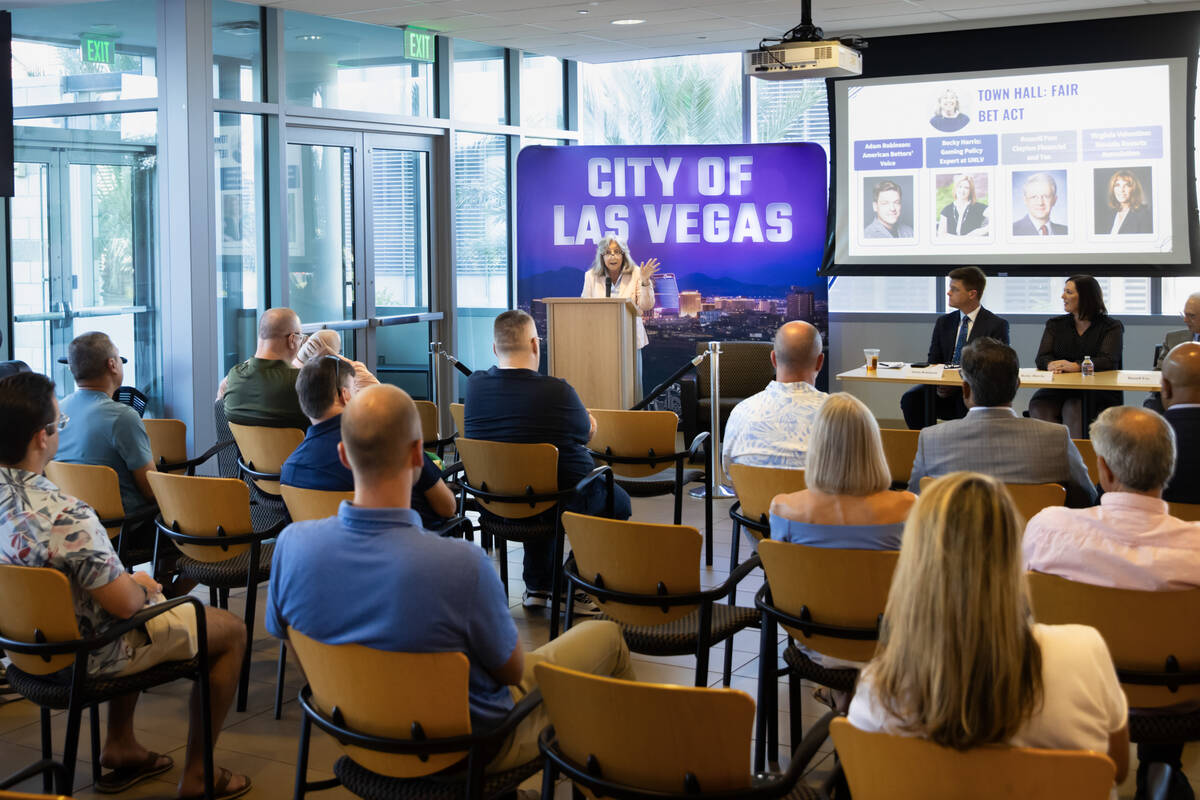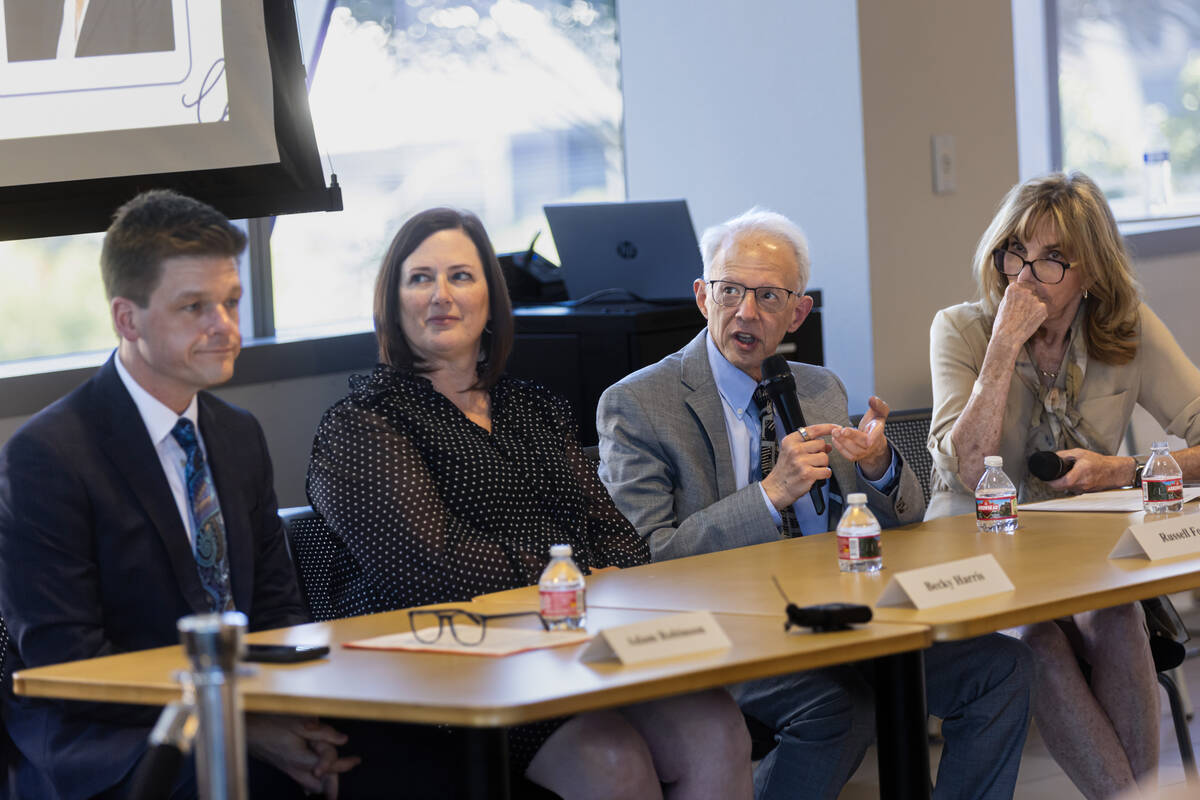Trump’s bill changed gambling tax law. Titus’ bill would change it back
Industry experts say a seemingly minor adjustment to the gambling tax code found in President Donald Trump’s signature bill is “bad policy” and could have major unintended consequences.
During a public town hall organized by U.S. Rep. Dina Titus, D-Nev., a panel comprised of gaming, tax and tourism experts concluded that the One Big Beautiful Bill Act’s change to gambling loss deductions will negatively affect gamblers and the casino industry.
“It’s a very simple change, but (it has) a great deal of impact,” Titus said at the start of the Aug. 11 town hall inside Las Vegas City Hall.
The change stems from an amendment in the OBBBA that limits the amount gamblers are able to deduct from their winnings to 90 percent of losses. For example, if someone won $100,000 during a trip to a Las Vegas casino but lost $100,000 for the year, they would have to pay taxes on $10,000 rather than pay zero under the previous tax code. The new regulation goes into effect for 2026 tax filings.
Titus has introduced the Fair Accounting for Income Realized from Betting Earnings Taxation (FAIR BET) Act to restore gambling loss deductions to 100 percent.
Adam Robinson, a board member of the advocacy group American Bettors’ Voice, said the OBBBA’s change in policy forces people to pay taxes on “phantom income.”
“In the professional space, a lot of livelihoods depend on the fair taxation of gaming,” he said. “This new cap on the gambling loss deduction is fundamentally a fairness issue. It taxes people on money that they never earned.”
Nevada Resort Association President and CEO Virginia Valentine expressed concern that the state’s primary economic engine could suffer.
“The proposition when you walk into a casino is that you’re going to be treated fairly … the game’s going to be fair, and that, at the end of the day, you’re going to be taxed fairly,” Valentine said. “This (tax code change) challenges that notion.”
Appeals court upholds dismissal of price-fixing claims
A federal appellate court sided with a handful of Las Vegas hotel-casino operators in a class action claim alleging a price-fixing scheme to inflate room rates.
The San Francisco-based 9th U.S. Circuit Court of Appeals upheld a Nevada District Court’s dismissal of the suit against Caesars Entertainment, Treasure Island, JC Hospitality, Blackstone Inc., Wynn Resorts Holdings and Cendyn Group, a Florida-based hospitality data analytics and software firm. The court determined that the plaintiffs failed to demonstrate a coordinated effort on the part of the hotel operators who were all using the same room booking software.
“Rather than eliminating competition, pricing one’s hotel rooms in a manner calculated to maximize profits is how one competes,” the three-judge panel wrote.
A similar proposed consumer class action claim against several Atlantic City hotel-casino operators was dismissed in 2024.
Another state bans online sweepstakes
New Jersey is the fourth state to ban online sweepstakes gambling.
Gov. Phil Murphy signed a bill into law Friday prohibiting the practice where customers purchase virtual currency to play online casino games.
The Garden State joins Nevada, Montana and Connecticut as states that have legislatively enacted bans on online sweepstakes. New York lawmakers passed an online sweepstakes ban, but the governor has yet to sign the bill into law.
Opponents of online sweepstakes believe it too closely resembles real gambling. Sweepstakes proponents claim the bans are government overreach designed to protect existing gaming operators.
Bally’s Chicago IPO
Bally’s Corp. has completed an initial public offering to solicit investors for its Chicago casino, but the offering fell short of its fundraising expectations.
The company, which owns and operates a casino at Lake Tahoe and has ambitions to build a resort adjacent to the Athletics stadium on the Strip at Tropicana Avenue, provided 10,000 shares in four price tiers in its offering, but only sold 2,076 shares at $250 each, 173 shares at $2,500, 148 shares at $5,000 and 154 shares at $25,000.
“Nearly 1,800 unique shareholders, including 1,007 Chicagoans and 1,573 Illinois-based shareholders, are now partners of the project, going a long way to fulfilling our commitment to the City of Chicago,” Bally’s said in a statement.
The company was selected by the city in 2022 to build Chicago’s first casino that would feature a 500-room hotel, a 3,000-seat theater, 10 restaurants, 2,700 slot machines and 95 table games.






















